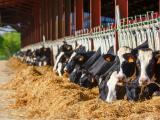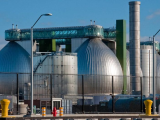Oct 18, 2005 (CIDRAP News) – The Swiss pharmaceutical company Roche announced today it would build a plant in the United States to make oseltamivir (Tamiflu) and also consider licensing other companies to make the drug in the face of a possible flu pandemic.
The company said the Food and Drug Administration has approved "an additional capsule manufacturing site in the US" to make the antiviral medicine, adding to a network of more than a dozen plants worldwide. The firm didn't disclose the location.
In addition, Roche Pharma Division CEO William M. Burns said in a news release, "We are prepared to discuss all available options, including granting sub-licenses, with any government or private company who approach us to manufacture Tamiflu or collaborate with us in its manufacturing."
The company has been under pressure from United Nations officials and others to lower the commercial barriers to production of oseltamivir by others. The drug is one of two neuraminidase inhibitors, the only drugs considered likely to be of much use if the H5N1 avian flu virus triggers a human flu pandemic.
But supplies of oseltamivir are short and production is slow. Roche said it has received orders from more than 40 countries. The United States is working to stockpile enough to treat 20 million people; officials have said they expect to have enough for about 4.3 million by the end of this year.
Roche previously expressed reluctance to license others to produce oseltamivir, according to an Agence France-Presse (AFP) report today. The report called today's announcement "an apparent about-turn."
Roche said the process of making oseltamivir is complex and lengthy. Burns said the company is prepared to discuss "sub-licenses" to others to increase production, "provided such groups can realistically produce substantial amounts of the medicine for emergency pandemic use, in accordance with appropriate quality specifications, safety and regulatory guidelines."
An Indian drug company, Cipla Ltd., said last week it planned to make an unauthorized generic version of oseltamivir and bring it to market early next year, according to the Associated Press (AP). But today the company said it would approach Roche about a license to make it, the AP reported.
A Roche spokeswoman said the government of Taiwan contacted the company yesterday about finding ways to increase production of the medicine, according to today's AFP story. She said this was the first overture from a government interested in collaborating with Roche.
Another Roche spokesman, David Reddy, said the company had not yet been approached by any private companies about making Tamiflu, according to a Reuters report today.
Thailand said earlier that it planned to make its own version of the drug by next October, Reuters reported.
The AP said oseltamivir is made from an acid produced by the Chinese star anise plant, which is grown only in four provinces of China and harvested between March and May. But in the past year Roche has developed a technique for making the acid without the plant, the story said.
Researchers reported last week that H5N1 virus isolated from a Vietnamese patient showed resistance to oseltamivir. But Roche said today that monitoring of ordinary flu cases has revealed little resistance to the antiviral.
In monitoring of about 4,000 patients treated with oseltamivir, resistance was found in about 0.4% of adults and 4% of children aged 1 to 12 years, the company said. Also, the statement said, resistance seems "very infrequent" in Japan, where about 6 million people received oseltamivir in the last flu season.
See also:
Oct 18 Roche news release
http://www.roche.com/med-cor-2005-10-18



















